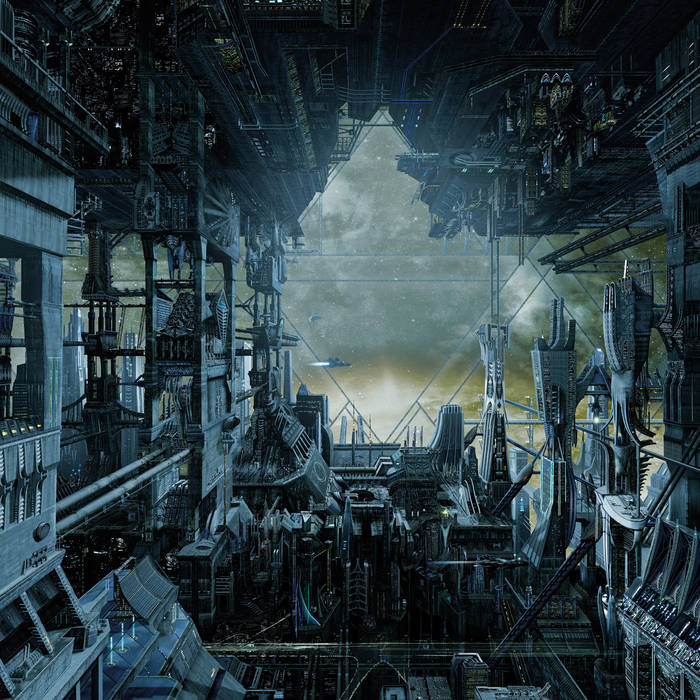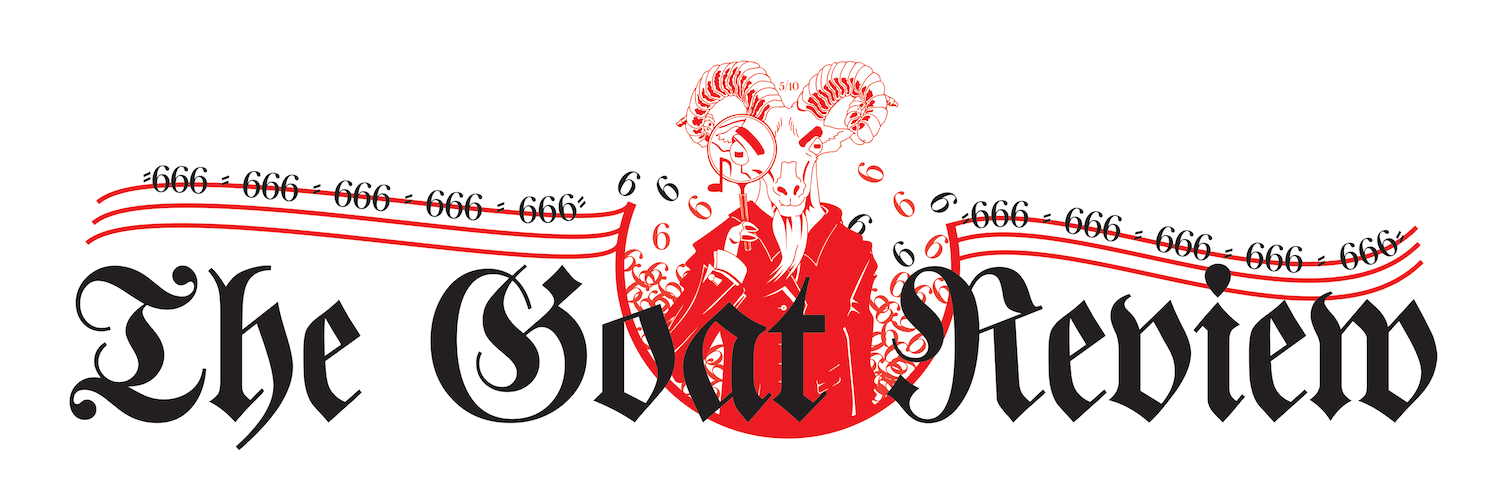
The Crypts of the Unknown harbors many festered treasures. Have you ever come across an album that you enjoy, but seemingly no other human in existence knows about it? Or maybe an album that ticks all the boxes in a style that doesn’t get a lot of love? Oh, and of course, you’ve found this album long after it would have mattered to help the band spread the word… or perhaps it’s just your dirty little secret…
Whatever the case, we here at The Goat Review prefer to air our loves to the world, to open the gates of our corroded Crypts to the masses. Today, join us as Metalligator reminisces on Khonsu’s 2016 release The Xun Protectorate. It may not be perfect, but how would you know?

Few bands that try to combine metal and electronic/industrial music manage the process well. Most of them carry the thought process as far as “We like metal and we like industrial, let’s do both!”, paying little attention to melding the two sounds further than that. Or, they are noisy black metal bands that stand in a corner, refusing to dance with their arm crossed. In this crowd, Khonsu stand out as special as a Norwegian two man-black metal band with connections to Keep of Kalessin (Steffen Grønbech being the brother of KoK‘s Arnt “Obsidian” Grønbech). And in this bold stance, The Xun Protectorate dances lithely while punching like an experienced boxer.
Khonsu is the kind of band that takes a long time between albums, but this slow yet methodical approach is what sets them apart. Grønbech also writes and plays all instruments, which offers a soft cohesion to all combined elements of their sound. The Khonsu base contains guitar forward black metal that alternates between shredding, mechanical industrial chugging, and atmospherically drawn out chords. Where their debut album Anomalia erred decidedly on Skinny Puppy-like industrial in it’s genre adventures, The Xun Protectorate pushes ahead into territories that would make most metalheads flee with a pained screech at its mention — trance. Yet, the songs on The Xun Protectorate don’t wear this influence as obviously as you might think, opting to inject the very dance-able melodies in the spring of the songs’ steps. Namely, you can often hear an unusually bright groove of the lead guitars that find accent in cannon ball-drums laying a carpet of intense double kicking as a floor. This low-end stomp leaves room for Khonsu‘s soaring guitar leads, spaced out and dance floor-fueled synths, and vocals to pirouette through space.
 This combo of riff-heavy black metal, pounding drums, and soaring vocals allows this album’s lofty narrative to stay grounded without sacrificing any of its melodic aspirations. Early highlight “The Observatory” shows this off well with a mechanical and bending lead riff that gives way to clean vocals, a hooking synth melody, and chugging guitars. In this moment, trance, industrial and black metal coexist while taking you through a song filled with twists and turns exploring the space between the genres. Lest you start to think this is a work of glitzy star-sparkle, the overall impression it leaves is one of cold space, near atmospheric to a fault. Underpinning the meaning of this space-faring machinery, Torstein Parelius of Manes has penned a sci-fi narrative that (from my reading of it) details a man finding some kind of spiritual awakening in an advanced civilization where everything is automatic and humanity rots without purpose. Lyrics are usually the element of metal that I pay the least attention to, but lyrics like “I am still a snake / And a dream is still a dream / If you’re sleeping or awake / A snake is still a snake” (“The Tragedy of the Awakened One”) have a compelling weight to them that complements well these wavering synth landscapes.
This combo of riff-heavy black metal, pounding drums, and soaring vocals allows this album’s lofty narrative to stay grounded without sacrificing any of its melodic aspirations. Early highlight “The Observatory” shows this off well with a mechanical and bending lead riff that gives way to clean vocals, a hooking synth melody, and chugging guitars. In this moment, trance, industrial and black metal coexist while taking you through a song filled with twists and turns exploring the space between the genres. Lest you start to think this is a work of glitzy star-sparkle, the overall impression it leaves is one of cold space, near atmospheric to a fault. Underpinning the meaning of this space-faring machinery, Torstein Parelius of Manes has penned a sci-fi narrative that (from my reading of it) details a man finding some kind of spiritual awakening in an advanced civilization where everything is automatic and humanity rots without purpose. Lyrics are usually the element of metal that I pay the least attention to, but lyrics like “I am still a snake / And a dream is still a dream / If you’re sleeping or awake / A snake is still a snake” (“The Tragedy of the Awakened One”) have a compelling weight to them that complements well these wavering synth landscapes.
The Xun Protectorate wears its influences on its sleeve proudly. As the end of the album nears with “A Dream of Earth,” Khonsu throws out a moment that would be a fully fledged trance song if not for the thick guitars humming along in the background. This song even goes as far as including the trance trope of wispy female clean vocals (sung by Eli Karoline Kvendseth) that would all but serve as a supremely cheesy moment on a metal album were it not for the fact that Khonsu has fought a whole album for it. The fact that Khonsu manage to pull this off shows how much attention Grønbech gives to the details and overall trajectory of his compositions. His love of electronic music seamlessly fuses with his love for metal.
On an album so loaded with highlights, the vocals throughout The Xun Protectorate manage to remain as impressive as the rest of the performances. The gritty delivery of harsh vocalist T’ol (Terje Olsen) and clean vocals of Rune Folgerø (of Manes) add a human element to the machine-like coldness swirling around them. For how many different voices there are involved in this album — the credits do not detail every layer specifically — they all feel in sync and playing to their strengths as if arranged by an invisible hand thoughtfully moving the chess pieces around. As the old saying goes, “a journey of a thousand miles begins with one step” — with the loom of a potential third Khonsu album on the horizon, now more than ever, this meticulous space odyssey of Khonsu‘s past is one you should know. The spiritual journey within is one you won’t regret taking.
